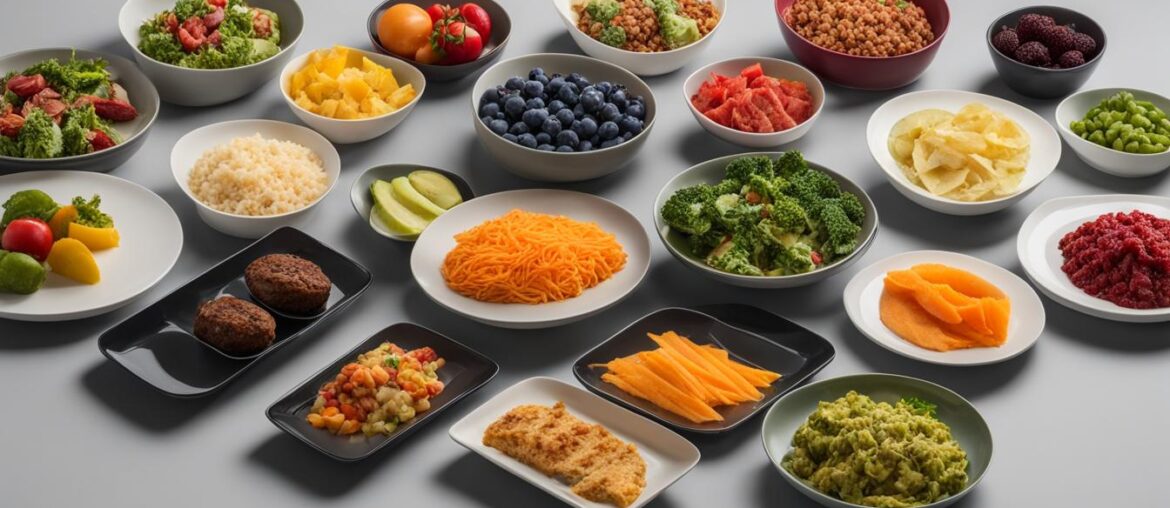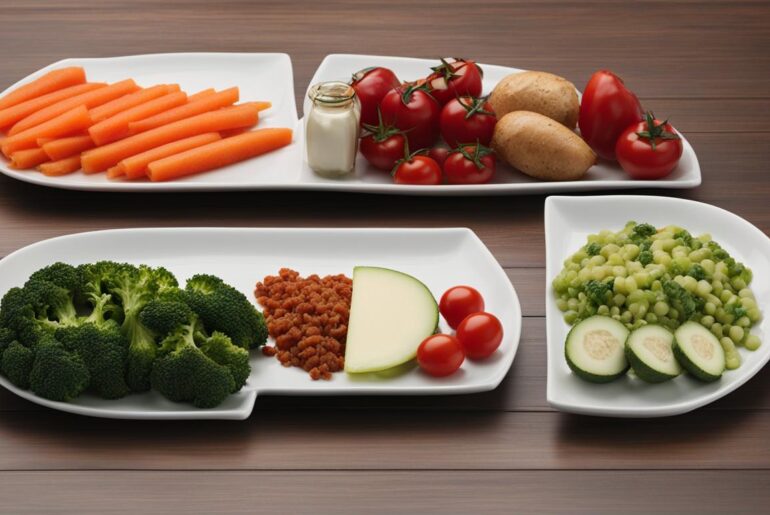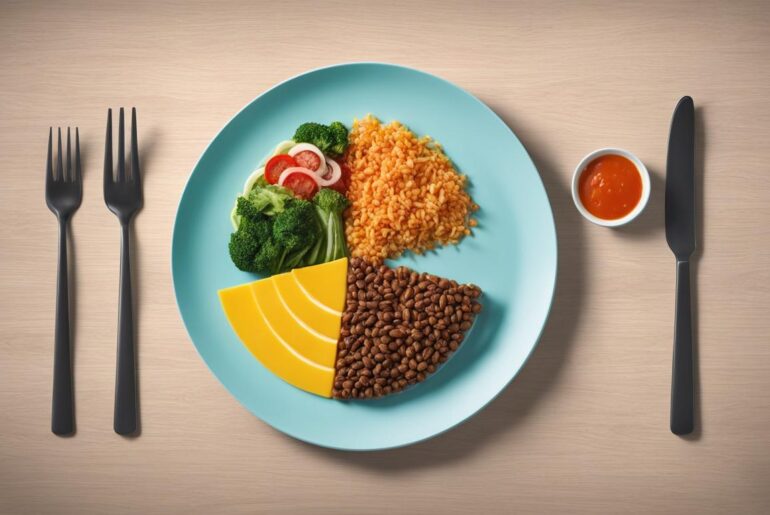When it comes to achieving weight loss goals, portion control is a fundamental element that should not be overlooked. Controlling portion sizes can make a significant difference in managing calorie intake and ultimately achieving weight reduction. By measuring food portions, tracking food intake, and implementing portion control techniques, you can create a healthier eating habit and increase the chances of weight loss success.
One effective technique for portion control is using smaller plates. By using a smaller plate, you can prevent overloading and make standard-sized portions feel satisfying. This simple change can trick your brain into thinking you are consuming more substantial portions without consuming excess calories.
Another helpful tip is double-checking your carbohydrate intake. Carbohydrates are often a significant source of calories in our diets, and it’s essential to be mindful of portion sizes to avoid unnecessary calorie intake. Measuring cups can be a valuable tool to gauge the right amount of carbohydrates, ensuring consistency and portion control.
It’s crucial to be selective with seconds as well. Instead of reaching for high-calorie desserts or unhealthy options, consider opting for healthier choices like fruit or vegetables. By making these small choices, you can maintain portion control and avoid overeating.
Additionally, avoid picking at leftovers or finishing off others’ portions. These seemingly innocent actions can contribute to overeating and hinder your weight loss progress. Instead, listen to your body and wait at least 20 minutes before reaching for seconds. This will allow time for your brain to receive the fullness signals and prevent mindless eating.
When grocery shopping, it’s important to be aware of portion sizes indicated on food labels. By understanding serving sizes, you can accurately track your calorie intake and ensure portion control. This knowledge will help you make more informed decisions about the foods you consume.
Lastly, when dining out, be mindful of supersized portions often served in restaurants. These oversized portions can be tempting but can sabotage your portion control efforts. Consider skipping extras like bread or chips to maintain a balanced portion size and stay on track with your weight loss goals.
Key Takeaways:
- Using a smaller plate can prevent overloading and make standard-sized portions feel satisfying.
- Double-check your carbohydrate intake to avoid doubling your portion size unnecessarily.
- Measuring cups can help gauge the right amount to eat and ensure consistency.
- Be selective with seconds and opt for healthier choices, like fruit instead of high-calorie desserts.
- Avoid picking at leftovers or finishing off others’ portions to prevent overeating.
The Importance of Portion Control for Weight Loss
Portion control is crucial for weight management, as it helps regulate calorie intake. Consuming more calories than your body needs leads to weight gain. By implementing portion control, you can maintain or lose weight by managing calorie intake.
Portion control is not about depriving yourself, but rather about making smarter choices and being mindful of how much you eat. Understanding serving sizes and making informed decisions is key. It allows you to enjoy a variety of foods without overeating or feeling deprived.
Portion control is a sustainable and rewarding approach to weight loss. By managing portion sizes, you can maintain a healthy weight and support your overall well-being.
Impact of Portion Size on Calorie Intake
The size of your portions directly affects your calorie intake. Consuming larger portions means consuming more calories, which can lead to weight gain. On the other hand, reducing portion sizes can help create a calorie deficit, promoting weight loss.
By weighing your food and paying attention to portion sizes, you can control your calorie intake and make adjustments to achieve your weight loss goals. Portion control is an effective strategy for managing your weight in a healthy and sustainable way.
Benefits of Portion Control
Eating smaller, well-balanced portions allows you to enjoy your favorite foods while still maintaining a healthy weight.
Implementing portion control has numerous benefits for both your physical health and overall well-being:
- Weight management: Portion control helps you manage your calorie intake, which is essential for weight maintenance or weight loss.
- Prevents overeating: By controlling portion sizes, you can avoid the common tendency to overeat, reducing the risk of weight gain.
- Promotes healthy eating habits: Paying attention to portion sizes encourages mindful and conscious eating, helping you develop healthier eating habits (check out my post on healthy eating habits here).
- Enhances satisfaction: Enjoying balanced portions ensures that you feel satisfied after meals, without feeling deprived or hungry.
By incorporating portion control into your lifestyle, you can achieve and maintain a healthy weight while still enjoying the foods you love.
| Portion Control Tips | |
|---|---|
| Use smaller plates and bowls | |
| Read food labels to understand serving sizes | |
| Practice mindful eating and listen to your body’s hunger cues | |
| Avoid eating straight from the package | |
| Plan and prepare meals in advance | |
| Choose nutrient-dense, low-calorie foods |
The Relationship Between Diet and Portion Control
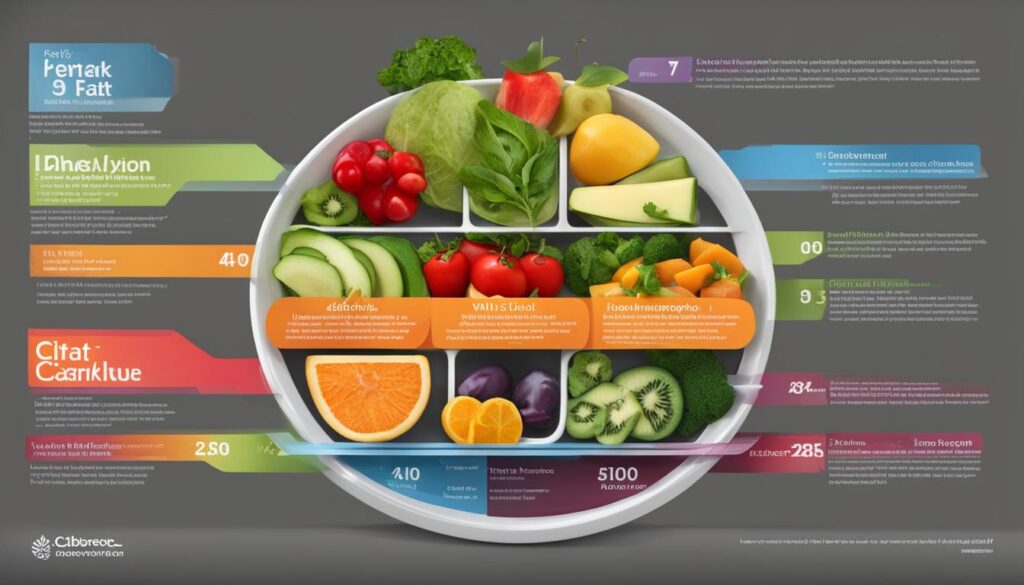
Portion control plays a crucial role in maintaining a balanced diet and promoting healthy eating habits. By regulating calorie intake and preventing overeating, portion control helps individuals maintain a healthy weight and reduce the risk of chronic diseases such as diabetes and heart disease.
When it comes to portion control, it’s important to note that different food items have varying portion sizes and calorie content. Even healthy foods can contribute to weight gain if consumed in large portions. That’s why understanding portion sizes and practicing portion control are essential for a healthy lifestyle.
By incorporating portion control into their diet, individuals can ensure they are getting the right amount of nutrients without overindulging. It allows for a balanced approach to eating, where individuals can enjoy a variety of foods while still maintaining a healthy weight. With portion control, individuals can prevent excessive calorie intake, promote healthy eating habits, and achieve their weight loss goals.
The Importance of Regulating Calorie Intake
One of the key benefits of portion control is its role in regulating calorie intake (see my post here). By controlling portion sizes, individuals can prevent excessive calorie consumption and maintain a healthy weight. This is particularly important for individuals looking to lose weight, as consuming more calories than the body needs can lead to weight gain.
When practicing portion control, individuals should pay attention to the calorie content of the foods they consume. By choosing nutrient-dense options and monitoring portion sizes, individuals can ensure they are meeting their nutritional needs without overindulging in calorie-dense foods.
| Food | Portion Size | Calories |
|---|---|---|
| Grilled Chicken Breast | 3 oz | 120 |
| White Rice | 1 cup | 206 |
| Broccoli | 1 cup | 55 |
| Salmon | 4 oz | 280 |
| Quinoa | 1/2 cup | 111 |
As seen in the table above, portion sizes can greatly impact calorie intake. By practicing portion control and choosing appropriate serving sizes, individuals can regulate their calorie intake and support overall health and well-being.
By incorporating portion control into their diet and regulating calorie intake, individuals can prevent overeating, promote healthy eating habits, and achieve their weight loss goals.
The Role of Portion Control in Preventing Overeating
Preventing overeating and weight gain is a crucial aspect of maintaining a healthy lifestyle. Portion control strategies play a significant role in achieving this goal. Serving smaller portions is an effective way to reduce calorie intake while still providing satisfaction. By consciously controlling portion sizes, individuals can prevent overeating and avoid excessive weight gain.
Large portion sizes in restaurants and fast food chains often contribute to overeating. These establishments prioritize quantity over quality, leading individuals to consume more calories than necessary. However, practicing portion control allows individuals to eat smart rather than eat less. It emphasizes the importance of enjoying favorite foods in moderation without feeling deprived.
“Portion control is about eating smart, not eating less.”
By implementing portion control strategies, individuals can create a healthier and more satisfying eating experience (see my post here). It allows for a balanced approach to food consumption, promoting greater awareness and mindfulness in every meal. Portion control techniques help individuals make smarter choices, avoid excessive calorie intake, and build sustainable habits for long-term weight management.
| Benefits of Portion Control | Strategies for Portion Control |
|---|---|
| Prevents overeating | Use smaller plates and bowls |
| Reduces calorie intake | Read food labels to understand serving sizes |
| Promotes healthier weight management | Practice mindful eating and slow down during meals |
| Creates a more satisfying eating experience | Opt for nutrient-dense foods |
| Practice portion control when dining out |
By incorporating portion control strategies into daily life, individuals can prevent overeating, promote weight gain prevention, and establish a healthier relationship with food. Portion control is not about restriction or deprivation; it’s about finding the right balance and taking control of one’s eating habits. With mindful practices and a focus on portion sizes, individuals can achieve their weight loss goals while still enjoying the foods they love.
Practical Tips for Implementing Portion Control in Your Daily Diet
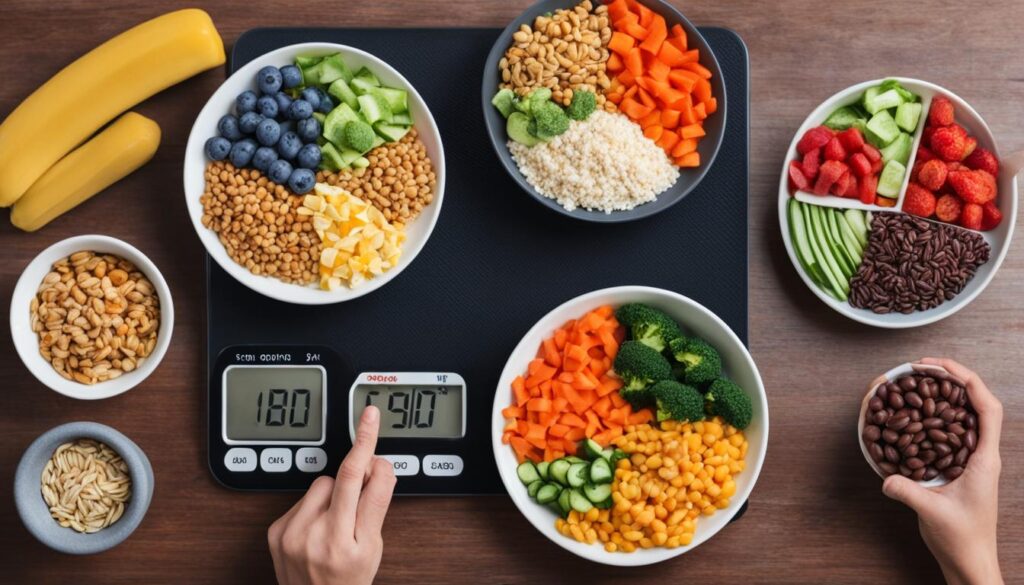
Implementing portion control can be a game-changer when it comes to achieving your weight loss goals. Here are some practical tips to help you effectively control your portions and make healthier eating choices.
1. Using Smaller Plates and Bowls
Believe it or not, the size of your plate can influence how much you eat. Using smaller plates and bowls can trick your brain into perceiving a larger portion. Fill up these smaller dishes with wholesome and nutrient-dense foods, allowing you to enjoy a satisfying meal while consuming fewer calories.
2. Reading Food Labels
Don’t underestimate the power of reading food labels. They provide valuable information on serving sizes, calorie content, and nutritional composition. By familiarizing yourself with these labels, you can make smarter choices and better manage your portion sizes.
3. Meal Prepping
Meal prepping is a fantastic way to take control of your portion sizes. By preparing your meals in advance, you can measure and distribute appropriate amounts of food into individual containers. This practice not only helps with portion control but also saves time and reduces the temptation to indulge in unhealthy options.
4. Sharing Meals and Taking Home Leftovers
When dining out, consider sharing a meal with a partner or friend. Many restaurant portions are significantly larger than what is recommended for a healthy meal. Sharing allows you to enjoy the flavors without overeating. Additionally, if there are leftovers, take them home instead of forcing yourself to finish everything on your plate.
5. Filling Up on Low-Calorie, High-Volume Foods
Filling your plate with low-calorie, high-volume foods is an effective way to control your portions while feeling satisfied. Fruits, vegetables, whole grains, and lean proteins are excellent choices as they provide essential nutrients and fiber. These foods take up space in your stomach without contributing excessive calories, ensuring you stay on track with your portion control goals.
| Practical Portion Control Tips |
|---|
| Using smaller plates and bowls |
| Reading food labels |
| Meal prepping |
| Sharing meals and taking home leftovers |
| Filling up on low-calorie, high-volume foods |
Remember, portion control is about finding balance and satisfaction. It’s not about deprivation or cutting out your favorite foods entirely. By implementing these practical tips, you can make portion control a sustainable part of your daily life and pave the way for successful weight management (check out my post on successful weight management here).
The Science Behind Portion Control: What Research Says
Scientific studies consistently demonstrate the significant role of portion control in maintaining a healthy weight and promoting weight loss. These studies shed light on the portion size effect and the effectiveness of portion control as a strategy for managing weight successfully.
The portion size effect is a phenomenon observed in research where individuals tend to consume more when served larger portions. This effect reveals the influence of portion size on food consumption and highlights the importance of controlling portion sizes to manage calorie intake effectively.
Moreover, numerous scientific studies have shown that implementing portion control is an effective strategy for weight loss. By understanding and managing portion sizes, individuals can regulate their calorie intake, which is crucial for maintaining a healthy weight. Research supports the idea that mindful consideration of portion sizes leads to better control over food consumption and assists in achieving weight loss goals.
Understanding portion sizes and implementing portion control have been proven to be supported by research. These scientific findings confirm the effectiveness of portion control in managing weight and promoting a healthy lifestyle.
Ultimately, portion control is a science-backed strategy that empowers individuals to take control of their eating habits, make informed choices, and achieve their weight loss goals successfully.
Conclusion
Mastering portion control is crucial for weight loss success. By effectively managing the size of your food portions, you can better regulate your calorie intake and prevent overeating. Portion control is not only about controlling the quantity of food you consume but also plays a vital role in maintaining a balanced diet.
Implementing practical portion control strategies can lead to significant benefits. It allows you to enjoy a variety of foods without feeling deprived or restricted. Using smaller plates and bowls, reading food labels for serving sizes, and incorporating meal prepping into your routine are effective strategies to control portion sizes.
Research supports the effectiveness of portion control for weight loss. Studies have consistently shown the portion size effect, which suggests that people tend to consume more when served larger portions. By taking control of your portion sizes, you can achieve your weight loss goals and establish healthier eating habits.
In summary, mastering portion control is a sustainable and rewarding approach to long-term weight management and overall well-being (check this post out). By implementing practical tips and strategies, individuals can successfully navigate the challenges of portion control, maintain a balanced diet, and achieve their desired weight loss outcomes.

